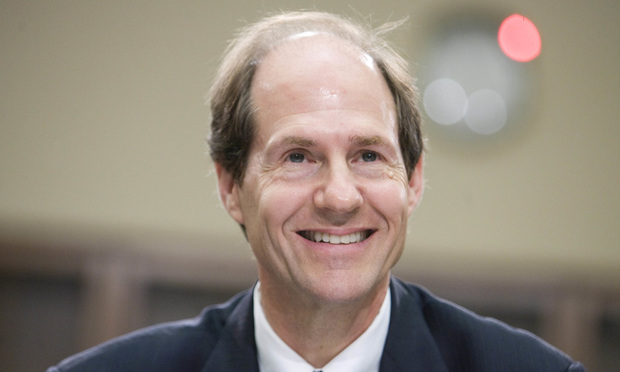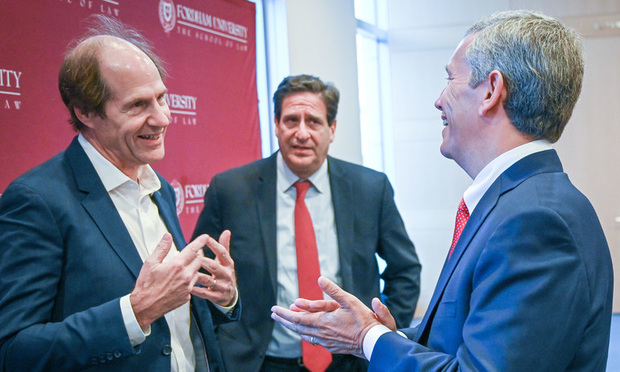Trump's Procedural Rights Curbed During Impeachment Inquiry, Legal Scholar Says
"The argument was that the president has been denied due process because there's no cross examination going on in the House," Sunstein said. "The first thing to say is that it's not a criminal trial and there's no right in these things to cross examination."
October 15, 2019 at 07:57 PM
6 minute read
 Cass Sunstein. Photo: Diego M. Radzinschi/ALM
Cass Sunstein. Photo: Diego M. Radzinschi/ALM
Attorneys for President Donald Trump were wrong to think they should have the right to cross-examine witnesses, and call their own individuals, in the impeachment inquiry from Democrats in Congress, prominent legal scholar Cass Sunstein said Tuesday evening.
That was part of Sunstein's comments at an event held by the New York State Bar Association at Fordham University School of Law in Manhattan.
Sunstein, a professor at Harvard Law School, was invited to speak by the State Bar to talk about the legal process and ramifications of impeachment, which has been on the minds of many as Democrats continue their formal inquiry into Trump this week.
Just last week, White House Counsel Pat Cipollone wrote in a letter to Democratic leaders in Congress that they took issue with not being afforded the opportunity to review evidence, cross-examine individuals, and subpoena their own witnesses.
But Sunstein said, during his remarks at Fordham Law, that the Trump administration isn't afforded that right during the impeachment inquiry.
"The argument was that the president has been denied due process because there's no cross examination going on in the House," Sunstein said. "The first thing to say is that it's not a criminal trial and there's no right in these things to cross examination."
That same letter from the White House last week appeared to suggest that the Trump administration would stand in the way of efforts by federal lawmakers to seek participation in their impeachment inquiry by individuals within the executive branch of government.
Sunstein cautioned against any efforts by the Trump administration to block those requests from Democrats, likening that behavior to similar actions taken by former President Richard Nixon during his own brush with impeachment.
"The White House right now … would be well-advised to be very careful about refusing to respond to subpoenas," Sunstein said. "There would be a lot of explaining to do to justify the conclusion that that's not an impeachable offense in the context of an impeachment inquiry."
Sunstein also said that, if the House goes forward with a vote on articles of impeachment against Trump in the future, the Senate would have no option but to hold a trial on those claims. To do otherwise, he said, would be to contradict the intent of the U.S. Constitution.
"The Senate is constitutionally obliged to hold a trial. It can't just say no," Sunstein said. "If the House sees fit to impeach the president, then the Senate seems obliged to do its constitutional homework."
The event was co-sponsored by Fordham Law School and the New York State Writers Institute from the University at Albany.
 Prof. Cass R. Sunstein, author of "Impeachment: A Citizen's Guide" and the Robert Walmsley University Professor at Harvard University, was the featured speaker at an event co-sponsored by the New York State Bar Association on Oct. 15 at Fordham University School of Law. Chatting before the event were, left to right, Sunstein, Matthew Diller, dean of the Fordham University School of Law, and NYSBA President Hank Greenberg. (Photo by David Handschuh/NYLJ)
Prof. Cass R. Sunstein, author of "Impeachment: A Citizen's Guide" and the Robert Walmsley University Professor at Harvard University, was the featured speaker at an event co-sponsored by the New York State Bar Association on Oct. 15 at Fordham University School of Law. Chatting before the event were, left to right, Sunstein, Matthew Diller, dean of the Fordham University School of Law, and NYSBA President Hank Greenberg. (Photo by David Handschuh/NYLJ)Sunstein is considered one of the country's leading legal scholars on the process of impeachment, and other areas of constitutional and administrative law. He's currently the Robert Walmsley University Professor at Harvard Law School, where he's also the founder and director of the program on behavior economics and public policy.
He's published several articles and books related to the topic, but has most recently been recognized for authoring "Impeachment: A Citizen's Guide" in 2017. The book provides an explainer of the history and legal process of impeachment.
Aside from his published works regarding impeachment, Sunstein also worked as an attorney-adviser in the Office of Legal Counsel of the U.S. Department of Justice. During the first term of the Obama administration, he was the administrator of the White House Office of Information and Regulatory Affairs.
Federal lawmakers returned to Washington, D.C., on Tuesday after a two-week recess during which the impeachment inquiry launched by Democrats has sharply escalated, with a handful of witnesses delivering testimony behind closed doors, and more expected this week.
It's been nearly a month since House Speaker Nancy Pelosi, D-California, announced a formal impeachment inquiry into Trump after it was reported that he encouraged Ukrainian officials to investigate former Vice President Joe Biden and his son, who served on the board of a Ukrainian gas company while his father was in office.
Democrats have suggested that Trump encouraged Ukrainian President Volodymyr Zelensky to investigate Biden in exchange for continued foreign aid from the U.S. Trump has said a quid pro quo agreement between the two didn't exist, and Zelensky has said he didn't feel pressured.
That information came to light after, earlier this year, an anonymous government whistleblower reported the content of that call to the inspector general of the U.S. intelligence community. A summary of that call was later released publicly, which prompted Democrats to launch the impeachment inquiry.
Republicans have labeled the inquiry as political fodder for Democrats ahead of next year's elections, which could determine which party controls both chambers of Congress, as well as the White House itself.
Among the events scheduled this week in the impeachment inquiry is the testimony of U.S. Ambassador to the European Union Gordon Sondland, who's expected to tell Congress it was unclear whether Trump was truthful when he said, privately, he didn't intend on a quid pro quo agreement when he mentioned Biden while speaking about foreign aid.
READ MORE:
En Banc Fourth Circuit Will Reconsider Its Trump Emoluments Ruling
Jon Sale Confirms Work for Giuliani Has Ended After Subpoena Snub
After Circuit Court Loss, Trump's Lawyers Could Delay a Final Ruling in Dems' Subpoena Case
This content has been archived. It is available through our partners, LexisNexis® and Bloomberg Law.
To view this content, please continue to their sites.
Not a Lexis Subscriber?
Subscribe Now
Not a Bloomberg Law Subscriber?
Subscribe Now
NOT FOR REPRINT
© 2025 ALM Global, LLC, All Rights Reserved. Request academic re-use from www.copyright.com. All other uses, submit a request to [email protected]. For more information visit Asset & Logo Licensing.
You Might Like
View All

'You Became a Corrupt Politician': Judge Gives Prison Time to Former Sen. Robert Menendez for Corruption Conviction
5 minute read
Federal Judge Pauses Trump Funding Freeze as Democratic AGs Plan Suit
4 minute readTrending Stories
- 1Uber Files RICO Suit Against Plaintiff-Side Firms Alleging Fraudulent Injury Claims
- 2The Law Firm Disrupted: Scrutinizing the Elephant More Than the Mouse
- 3Inherent Diminished Value Damages Unavailable to 3rd-Party Claimants, Court Says
- 4Pa. Defense Firm Sued by Client Over Ex-Eagles Player's $43.5M Med Mal Win
- 5Losses Mount at Morris Manning, but Departing Ex-Chair Stays Bullish About His Old Firm's Future
Who Got The Work
J. Brugh Lower of Gibbons has entered an appearance for industrial equipment supplier Devco Corporation in a pending trademark infringement lawsuit. The suit, accusing the defendant of selling knock-off Graco products, was filed Dec. 18 in New Jersey District Court by Rivkin Radler on behalf of Graco Inc. and Graco Minnesota. The case, assigned to U.S. District Judge Zahid N. Quraishi, is 3:24-cv-11294, Graco Inc. et al v. Devco Corporation.
Who Got The Work
Rebecca Maller-Stein and Kent A. Yalowitz of Arnold & Porter Kaye Scholer have entered their appearances for Hanaco Venture Capital and its executives, Lior Prosor and David Frankel, in a pending securities lawsuit. The action, filed on Dec. 24 in New York Southern District Court by Zell, Aron & Co. on behalf of Goldeneye Advisors, accuses the defendants of negligently and fraudulently managing the plaintiff's $1 million investment. The case, assigned to U.S. District Judge Vernon S. Broderick, is 1:24-cv-09918, Goldeneye Advisors, LLC v. Hanaco Venture Capital, Ltd. et al.
Who Got The Work
Attorneys from A&O Shearman has stepped in as defense counsel for Toronto-Dominion Bank and other defendants in a pending securities class action. The suit, filed Dec. 11 in New York Southern District Court by Bleichmar Fonti & Auld, accuses the defendants of concealing the bank's 'pervasive' deficiencies in regards to its compliance with the Bank Secrecy Act and the quality of its anti-money laundering controls. The case, assigned to U.S. District Judge Arun Subramanian, is 1:24-cv-09445, Gonzalez v. The Toronto-Dominion Bank et al.
Who Got The Work
Crown Castle International, a Pennsylvania company providing shared communications infrastructure, has turned to Luke D. Wolf of Gordon Rees Scully Mansukhani to fend off a pending breach-of-contract lawsuit. The court action, filed Nov. 25 in Michigan Eastern District Court by Hooper Hathaway PC on behalf of The Town Residences LLC, accuses Crown Castle of failing to transfer approximately $30,000 in utility payments from T-Mobile in breach of a roof-top lease and assignment agreement. The case, assigned to U.S. District Judge Susan K. Declercq, is 2:24-cv-13131, The Town Residences LLC v. T-Mobile US, Inc. et al.
Who Got The Work
Wilfred P. Coronato and Daniel M. Schwartz of McCarter & English have stepped in as defense counsel to Electrolux Home Products Inc. in a pending product liability lawsuit. The court action, filed Nov. 26 in New York Eastern District Court by Poulos Lopiccolo PC and Nagel Rice LLP on behalf of David Stern, alleges that the defendant's refrigerators’ drawers and shelving repeatedly break and fall apart within months after purchase. The case, assigned to U.S. District Judge Joan M. Azrack, is 2:24-cv-08204, Stern v. Electrolux Home Products, Inc.
Featured Firms
Law Offices of Gary Martin Hays & Associates, P.C.
(470) 294-1674
Law Offices of Mark E. Salomone
(857) 444-6468
Smith & Hassler
(713) 739-1250







